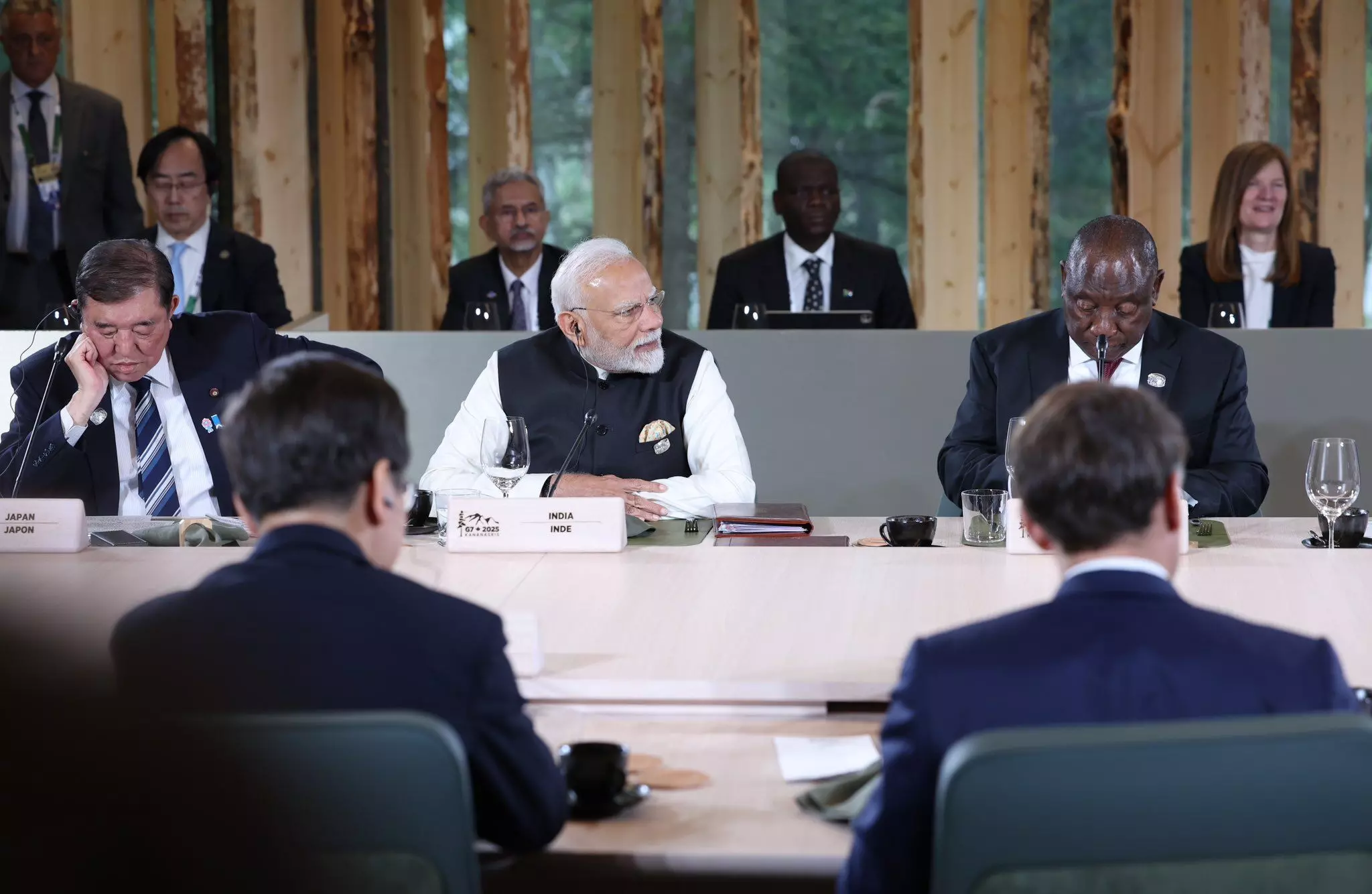India Steps Up: Modi’s G7 Visit and the Rise of a Global Anchor

The diplomatic welcome that Prime Minister Narendra Modi received while in Canada for the 2025 G7 Summit sends out a powerful signal that India has moved beyond its traditional role of cautious participant to become a confident voice shaping the global agenda.However, Modi’s presence at the G7 wasn’t just limited to formal addresses or press statements. He was seen holding one-on-one conversations with key leaders, including Canadian Prime Minister Mark Carney, French President Emmanuel Macron, and Japanese Prime Minister Fumio Kishida.
His informal exchange with US President Joe Biden drew media attention, with the two leaders reportedly discussing tech and defense collaboration. Modi’s ability to hold meaningful bilateral dialogues within the summit reaffirmed India’s importance in every major international equation.
Just a year ago, India-Canada relations had hit rock bottom following the childish way in which former Canadian PM Justin Trudeau handled the killing of Khalistani separatist Hardeep Singh Nijjar. The diplomatic fallout that ensued was swift and public. Visas were suspended, ambassadors recalled, and tensions ran high. For many, the damage seemed too deep for a quick recovery.
Yet in the space of a year, the tone has shifted dramatically. During the summit in Ontario, the two countries announced the restoration of full diplomatic services. High-level talks took place, and both sides acknowledged the importance of keeping communication open. For Canada, this was about pragmatism. For India, it was a quiet but firm assertion of its standing in the global order.
India’s Stand on Terrorism
Prime Minister Modi’s direct & timely G7 address cut to the heart of one of India’s long-standing concerns: the global community’s inconsistent approach to terrorism. He spoke with conviction about the need for a unified stance and criticized the tendency of some countries to overlook or even reward states that support terror networks.Addressing the G7 Outreach Session, he said, “The world must speak in one voice against terrorism. There should be no ifs and buts. Countries that support terrorism should be held accountable, not rewarded.”
India has been consistent in warning about how extremist elements, including those linked to the Khalistani movement, are exploiting democratic freedoms abroad to sow instability at home. Modi’s comments served as both a warning and a plea for clarity. In a world increasingly shaped by ideological violence, silence and selective outrage are no longer neutral acts.
What was significant is that this call-out came not from the sidelines but from the center stage of the G7. India, once expected to align with larger powers, is now influencing how those powers define shared security.
Building Beyond Borders
India’s presence at the summit was not limited to security issues. Modi participated in discussions on clean energy, quantum technologies, AI, and global infrastructure. These aren’t just buzzwords in India’s policy playbook. They are part of the country’s lived reality and future ambitions, he assured the world.
In the bilateral press statement with Canadian Prime Minister Carney, the Indian PM reiterated, “India is ready to share its capabilities and experiences in clean energy, digital public infrastructure, and climate resilience. We believe in partnerships that uplift, not dominate.”
Initiatives like the International Solar Alliance and the Global Biofuels Alliance show that India isn’t just reacting to global issues—it is proactively shaping solutions. These efforts resonate with nations across the Global South that often feel overlooked in elite forums.
The Diplomacy of Maturity
The India-Canada reset offers lessons in mature diplomacy. By agreeing to move forward without brushing aside sensitive issues, both sides demonstrated that disagreement does not have to lead to disengagement. For India, this was not about conceding ground. It was about keeping the long game in mind—balancing principle with strategic interest.
Modi’s continued presence at the G7, now in its sixth consecutive year, is a reflection of this strategic patience. India is no longer seen as an occasional guest at global forums. It is becoming a necessary voice in every critical conversation.
India today is not seeking validation. It is offering direction. In a world searching for anchors amid rising instability, India is making its case with quiet confidence and visible results.
This is not just a moment for Indian diplomacy. It is a moment for India.
(The writer is a versatile content professional with 20+ years of experience, specializing in customized, high-impact writing across education, PR, corporate, and government sectors.)
